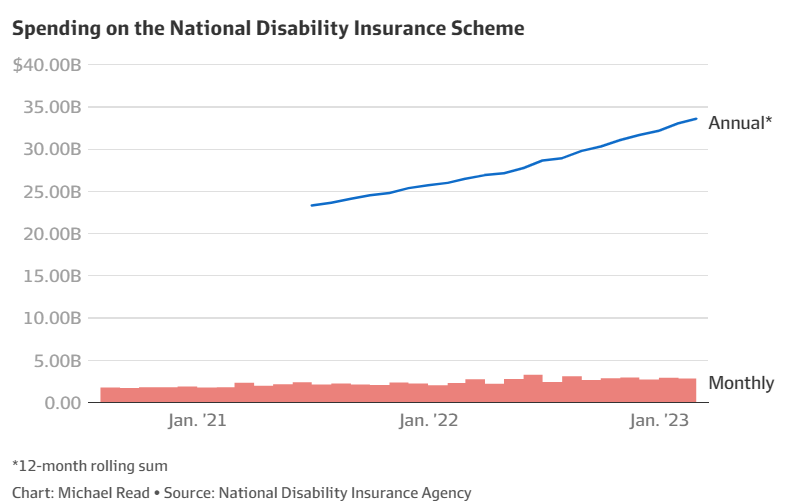The National Disability Insurance Scheme (NDIS) was initially projected to cost around $25 billion a year, but it is expected to cost $35.5 billion in 2022-23 and overtake Medicare spending:

The cost of the NDIS is also projected to balloon in cost to $51.8 billion by 2026, climbing by about 14% annually to $90 billion a year by 2032.
NDIS Minister Bill Shorten told the National Press Club on Tuesday that the scheme has “lost its way” and requires a full reboot.
Shorten outlined a six-point reform agenda that is aimed at ensuring that the NDIS is sustainable, including increasing NDIS staff and cracking down on service providers that are abusing the scheme.
Shorten also urged state governments to “step up” and ensure that they are meeting their funding obligations with regard to the NDIS.
While fraud and abuse by some participants are a clear issue with the NDIS, the bigger problem is that too many people are receiving support for what are minor ailments.
The SMH reports that Children are the fastest-growing category of NDIS participants, with about 10% of boys aged five to seven now on the scheme.
Does anybody seriously believe that one-in-ten young boys in Australia should be receiving NDIS funding?
The Australian’s social affairs editor Stephen Lunn recently revealed that children were being diagnosed with more severe autism than their characteristics warranted to give them a greater chance of securing a place in the NDIS. This has increased funding pressure.
Andrew Whitehouse, professor of autism research at the Telethon Kids Institute and the University of Western Australia, told The Australian: “It is without question that clinical behaviour has become biased towards making certain levels of an autism diagnosis in order to provide families a better chance at receiving the support they need through the NDIS”.
The NDIS certainly needs tighter regulation and enforcement to ensure that rorting and fraud are minimised.
But funding also needs to be better targeted at people with genuine disabilities.
Disclosure: I have a severe non-verbal autistic son on the NDIS.

